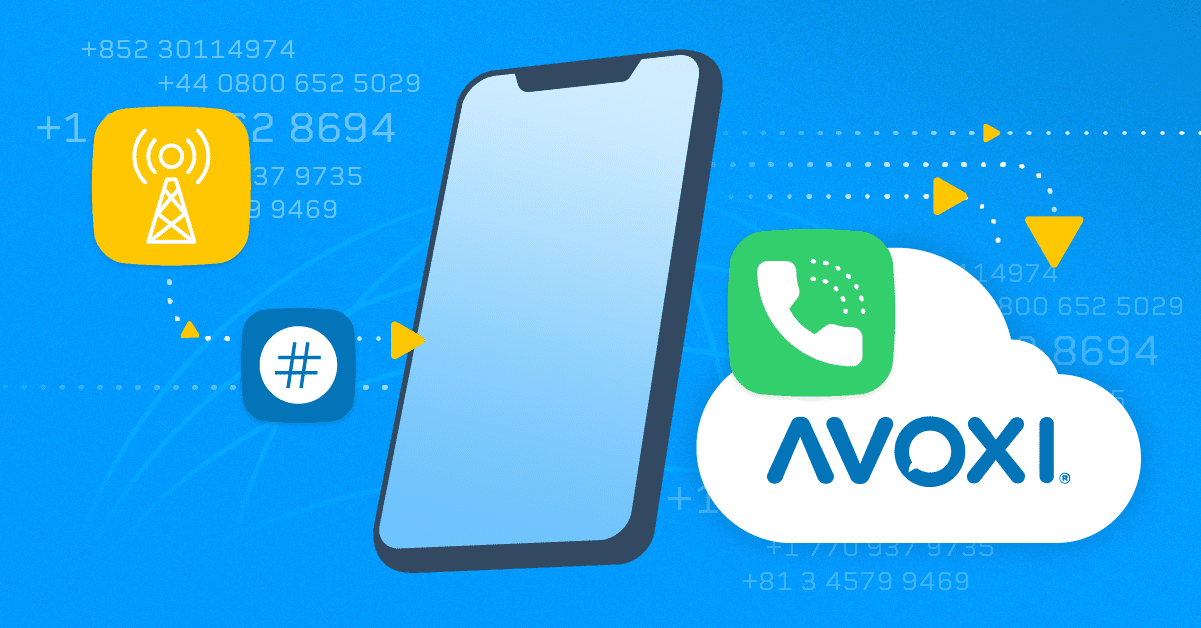Interactive Voice Response (IVR)
Interactive Voice Response (IVR)
Interactive Voice Response (IVR) bridges the gap between human interactions and automated telecommunication services.
What is interative voice response (IVR)?
What is IVR, and how has it become ubiquitous in our daily transactions and inquiries? Let’s demystify this technological marvel.
At its simplest, what is IVR stand for Interactive Voice Response, a term that encapsulates its function quite accurately. IVR systems allow a computer to interact with humans through voice commands or key inputs on a telephone.
This technology enables users to navigate a company’s services or database via pre-recorded voice prompts without human intervention.
So, when we talk about IVR, we're referring to a digital receptionist that guides callers through a menu of options, which allow them to choose the path that best satisfy their needs.
Why IVR is important
The significance of IVR in enhancing customer service and operational efficiency cannot be overstated. By directing customers to the appropriate department or providing them with the information they need, IVR systems significantly reduce wait times and improve the overall customer experience.
Additionally, IVR technology can handle a high volume of calls simultaneously, making it an invaluable asset for businesses of all sizes.
IVR technology represents a symbiosis of accessibility, efficiency, and automation. It stands as a testament to how far telecommunications have evolved, offering a user-friendly interface that caters to the needs of modern consumers and businesses alike.
As we delve further into the capabilities and applications of IVR, it becomes clear why this technology has become an integral component of customer service strategies across the globe.
How does IVR work?
To truly grasp IVR technology's functionality, understanding the IVR system and how it works is crucial.
An IVR system is the backbone of automated telephony solutions, facilitating efficient interactions between callers and a company's services through voice commands or touch-tone keypad selection.
The Mechanics Behind IVR Systems
At the heart of every IVR system is a software application that plays pre-recorded messages and navigates users through a menu of options. But what is IVR and how does it work in practical terms?
Imagine calling your utility company to inquire about your latest bill. Upon connecting, an IVR system greets you and presents a series of options: "Press 1 for billing, Press 2 for support, Press 3 for more options." Your selection determines the next set of instructions or information you receive without speaking to a human agent.
A Closer Look at IVR Technology
This seamless operation is powered by sophisticated software that integrates with a company's database to pull and provide specific information the caller requests. For instance, if you select the billing option, the IVR system accesses your account details to relay your billing information.
This process illustrates the essence of what is IVR system functionality – enabling direct, efficient interaction with services through automated voice prompts.
Through IVR systems, businesses can offer 24/7 support, handle high call volumes, and provide personalized customer experiences without significantly increasing operational costs.
The IVR system exemplifies how automation and technology can elevate customer service standards, making it an indispensable tool in today’s digital communication landscape.
Call Center IVR: Revolutionizing Customer Service
Interactive Voice Response (IVR) technology has become a linchpin in call center operations, significantly enhancing customer service delivery.
IVR in call centers streamlines the customer experience and boosts efficiency, allowing for the handling of a large volume of what is known as IVR calls with ease and precision.
Transforming Customer Interactions with IVR
The role of IVR in call centers is multifaceted. It serves as customers' first point of contact, efficiently guiding them through various options and ensuring they are connected with the correct department or information source.
This automated system can answer common inquiries, manage appointments, and even process orders without engaging a live agent. For example, a caller wanting to check an account balance or schedule a service appointment can easily do so through the IVR system, experiencing prompt service without wait times.
Efficiency and Personalization Through IVR
One of the key benefits of implementing IVR in call centers is the significant increase in operational efficiency. By automating routine tasks and queries, IVR systems allow agents to focus on more complex customer issues, enhancing overall productivity.
Moreover, modern IVR systems can personalize interactions by identifying callers based on their phone numbers and providing tailored options based on their history with the company.
Real-World IVR Applications
A practical "what is IVR example" in a call center context might involve a telecommunications company. When customers call for support, the IVR system can quickly identify whether they are calling about technical support, billing inquiries, or purchasing new services, directing them accordingly. This speeds up the resolution process and improves customer satisfaction by minimizing frustration and wait times.
In essence, IVR technology has redefined the dynamics of call centers, making them more efficient and responsive to customer needs. By leveraging IVR, call centers can provide a smoother, more effective service experience, demonstrating the value of technology in enhancing customer interactions.
The Critical Role of IVR in Modern Business Communications
Interactive Voice Response (IVR) systems represent a fundamental shift in how businesses interact with customers. Understanding the importance of IVR, especially in the context of what is IVR number, reveals why this technology is indispensable for contemporary enterprises aiming to streamline operations and elevate customer service.
IVR Numbers: Gateways to Efficiency and Engagement
An IVR number acts as a gateway, enabling customers to interact with a company’s services through a simple phone call.
When customers dial an IVR number, they are greeted by an automated voice that guides them through a series of options, allowing them to access information, perform transactions, or reach a specific department without direct human assistance.
This self-service capability enhances customer satisfaction by providing immediate assistance and significantly reduces the call volume handled by live agents, optimizing resource allocation.
Why IVR Holds Paramount Importance for Businesses
The importance of IVR extends beyond operational efficiency. Here are several reasons why IVR is crucial for businesses:
- Cost Reduction: By automating responses to common inquiries, IVR systems reduce the need for a large customer service team, directly impacting the bottom line.
- 24/7 Availability: IVR systems ensure that businesses can offer support and services around the clock, even outside regular business hours, catering to customers in different time zones.
- Personalization and Customer Satisfaction: Advanced IVR systems can personalize greetings and menus based on caller ID, enhancing the customer experience by making interactions quicker and more relevant.
- Data Collection and Insights: IVR systems can gather data from interactions, providing valuable insights into customer behavior and preferences, which can inform strategic decisions.
In conclusion, IVR technology facilitates efficient customer service, and it's a strategic tool that enables businesses to be more responsive, personalized, and efficient. By leveraging the capabilities of IVR numbers, companies can significantly enhance their customer engagement strategies, making IVR an essential component of modern business communications.
Navigating the Horizon: The Future and Scope of IVR Technology
As we look toward the future, the trajectory of Interactive Voice Response (IVR) technology points towards significant growth and innovation.
Understanding what is IVR technology today is just the tip of the iceberg when considering its potential to reshape customer service, engagement, and operational efficiency in the years to come.
The Evolution of IVR: Beyond Voice Commands
The future and scope of IVR technology are set to expand beyond traditional voice command interaction.
Advancements in artificial intelligence (AI) and machine learning are paving the way for more sophisticated, conversational IVR systems capable of understanding and responding to a broader range of customer queries with greater accuracy.
This evolution will enhance the user experience and open new avenues for automation across various industry sectors.
Enhancing Customer Interaction with Personalization
One of the critical areas of growth for IVR technology lies in personalization. Future IVR systems will likely offer more tailored experiences by leveraging data analytics to understand customer preferences and history.
IVR interactions could become as personalized and engaging as speaking with a human representative, further enhancing customer satisfaction and loyalty.
The Role of IVR Testing in Ensuring Quality
As IVR systems become more complex, the importance of IVR testing grows.
What is IVR testing? It's a critical process that ensures these systems can handle real-world scenarios, from straightforward requests to complicated inquiries. By simulating various customer interactions, businesses can identify and address potential issues before they impact the customer experience, ensuring that IVR technology continues to meet the evolving needs of both companies and their clients.
In conclusion, the future of IVR technology holds exciting possibilities for businesses looking to innovate their communication strategies. With continuous advancements in AI, personalization, and testing methodologies, IVR is poised to offer even more dynamic, efficient, and satisfying customer interactions.
As this technology progresses, companies that stay ahead of the curve will likely see the most significant benefits, reinforcing the vital role of IVR in the digital age.
Additional Resources

PSTN Replacement
Guide to Voice Termination Services

Retain Phone Number
International
Number Porting

Virtual Phone Line
Benefits of
SIP Trunking
Interested in Learning More?
AVOXI is the cloud communication platform of choice for enterprises and companies with international markets. The road to modernized communications has never been easier, learn what AVOXI can do for you today.